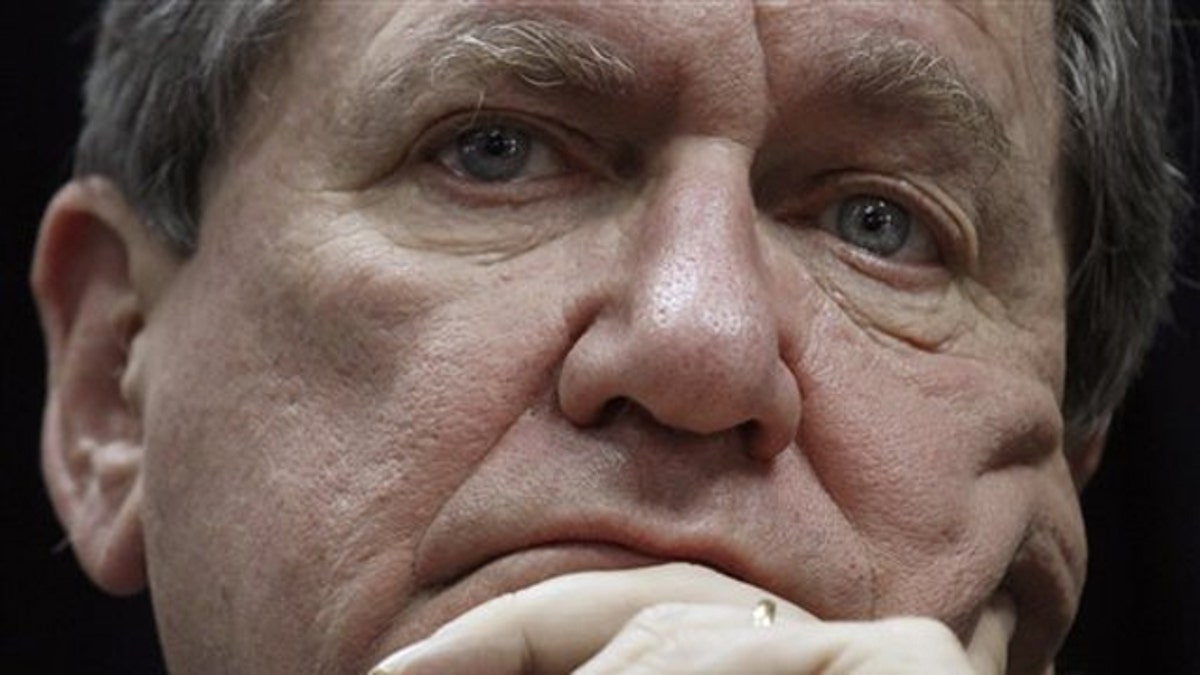
In this Jan. 17 file photo, diplomat Richard Holbrooke listens to questions in Kabul, Afghanistan. (AP Photo)
The president's year-end Afghanistan-Pakistan strategy review wasn't expected to contain any major course corrections. But with the sudden loss of his top diplomat in the region, President Obama will have to scour to find somebody who can fill the civilian commander role Richard Holbrooke played and ensure the strategy he helped develop succeeds.
Holbrooke, who died Monday at age 69, leaves a void in U.S. diplomacy surrounding the Afghanistan war. Holbrooke, as U.S. special representative for Afghanistan and Pakistan, had since the start of the Obama administration shuttled between capitals as he pressed a regional approach to the war -- the hard-nosed negotiator with a career of seminal accomplishments under his belt was the force behind U.S. aid to Pakistan and the build-up of American civilian liaisons in Afghanistan.
With a host of challenges confronting U.S. diplomatic and military forces in the region and the president recently adding some wiggle room for the timeline on U.S. troop presence in Afghanistan, Holbrooke may have issued the president a challenge in his last words.
The Washington Post reported that Holbrooke, as he was sedated before emergency surgery Friday for a tear in his aorta, told his Pakistani surgeon, "You've got to stop this war in Afghanistan."
"That can't not weigh heavily on the president," said Malou Innocent, a foreign policy analyst at the Cato Institute.
State Department spokesman P.J. Crowley said Tuesday that Holbrooke, before undergoing surgery, had a humorous exchange with the medical staff based on his "unrelenting" commitment to his job.
Told by the medical team to relax, Holbrooke replied "he couldn't relax because he was worried about Afghanistan and Pakistan," Crowley said. The medical team said it would try to have someone deal with those problems while he underwent surgery.
"See if you can end the war too," Holbrooke said, according to Crowley, who added that there was no recorder in the room but is the best recollection from people who were there.
To many in Washington, Holbrooke is irreplaceable. So the question facing the president is -- who can come close?
"There will not be another Richard Holbrooke. He really was a unique figure," said Kenneth Weinstein, president of the Hudson Institute.
Weinstein, who knew Holbrooke, said Obama does not necessarily need somebody as high-profile to succeed him, speculating that the president will tap an insider. He said Vali Nasr, a prominent Holbrooke adviser and scholar, could be eligible, as could Holbrooke's deputy Frank Ruggiero.
For the moment, Ruggiero will fill in as acting head of the State Department's Afghanistan-Pakistan team, according to the State Department. He previously oversaw civilians in southern Afghanistan and has held several positions in the State and Commerce departments.
It's unclear whether the assignment will become permanent. Should Obama look internally, several other potential candidates may have been in the room as the president met with his security team Tuesday morning -- a meeting Holbrooke had been scheduled to attend.
Expected participants in that meeting included National Security Adviser Tom Donilon, deputy National Security Adviser Denis McDonough, U.N. Ambassador Susan Rice, Afghanistan Ambassador Karl Eikenberry and Pakistan Ambassador Cameron Munter.
Innocent said Obama will need a scholar of the region "rather than simply a politico," somebody who can grasp the intricacies of how regional politics contribute to the chaotic security situation. She credited Holbrooke, for instance, with grasping how Pakistan's paranoia about India contributed to its tolerance of the Taliban.
Prominent Pakistani author Ahmed Rashid, in a column published Tuesday, described Holbrooke as just about the best U.S. ally Pakistan could have. Rashid said Holbrooke fought to improve relations with Pakistan, ease the nation's apprehensions about cooperating with the West and "for the first time" present a strategic vision for their joint relationship.
With Holbrooke gone, diplomatic tensions remain high, particularly in Afghanistan. And the remaining team may be struggling. An article Monday in The Washington Post described how Afghan President Hamid Karzai was becoming increasingly agitated with U.S. officials. "If I had to choose sides today, I'd choose the Taliban," he was quoted as saying in a recent meeting with Eikenberry, Gen. David Petraeus and other officials.
Eikenberry's grievances with Karzai are well-documented -- cables released nearly a year ago showed him warning officials in Washington that Karzai "is not an adequate strategic partner."
Weinstein said all those challenges -- the stability of the Karzai administration, economic development, democracy promotion -- remain for the next top regional diplomat.
"The situation is utterly challenging," he said. Weinstein said Obama could look for a former senator or somebody else prominent to swoop in from the outside to replace Holbrooke, but said "he's more likely to go internally with someone he really trusts."




